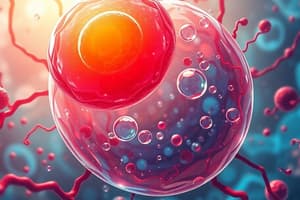Podcast
Questions and Answers
What was Tak Wah Mak's main area of research that led to his breakthrough discoveries?
What was Tak Wah Mak's main area of research that led to his breakthrough discoveries?
Which of the following scientific advancements did Tak Wah Mak NOT directly contribute to?
Which of the following scientific advancements did Tak Wah Mak NOT directly contribute to?
What was Tak Wah Mak's primary motivation for his extensive research on T-cells?
What was Tak Wah Mak's primary motivation for his extensive research on T-cells?
What key element of T-cell function did Tak Wah Mak's research help to uncover?
What key element of T-cell function did Tak Wah Mak's research help to uncover?
Signup and view all the answers
Which of the following best represents the impact of Tak Wah Mak's research on the field of immunology?
Which of the following best represents the impact of Tak Wah Mak's research on the field of immunology?
Signup and view all the answers
Flashcards
Tak Wah Mak
Tak Wah Mak
A prominent immunologist and molecular biologist known for T-cell research.
T-cell receptors
T-cell receptors
Proteins on T-cells that recognize and bind to antigens.
1983 T-cell discovery
1983 T-cell discovery
Revealed unique genetic sequences in T-cell receptors for antigen recognition.
Hodgkin's lymphoma treatment
Hodgkin's lymphoma treatment
Signup and view all the flashcards
Immunology breakthroughs
Immunology breakthroughs
Signup and view all the flashcards
Study Notes
Early Life and Education
- Tak Wah Mak was born in 1946 in southern China.
- He spent his childhood in Hong Kong.
- He and his family moved to the US, before he studied at the University of Wisconsin.
- He received a PhD in biochemistry from the University of Alberta, Canada in 1968.
Fellowship and T-Cell Research
- Became a fellow at the Ontario Cancer Institute in 1972, after completing his doctorate.
- Identified how T-cells (part of the immune system) recognize antigens.
- Advanced our molecular knowledge of cancer cells.
- Detailed the genetic encoding of human T-cell receptors in the March 1984 Nature journal.
Genetic Research and Targeted Treatment
- Used experiments with mice to isolate genetic function for cancer and immunology studies in 1988.
- Identified a chemical to block the fuel supply of Hodgkin's lymphoma (a rare cancer) in 1999.
T-Cell Breakthrough
- Mak solved a major immunology problem: how receptors on T-cells recognize antigens.
- His 1983 breakthrough discovered that genes for T-cell receptors have a unique genetic sequence and origin.
- This discovery advanced the study and treatment of immune-system diseases.
- Applied molecular techniques to understand immune responses to cancer.
Quote
- "We can never give up the fight against cancer." - Tak Wah Mak (2011)
Studying That Suits You
Use AI to generate personalized quizzes and flashcards to suit your learning preferences.
Description
Explore the groundbreaking work of Tak Wah Mak, a prominent figure in biochemistry and immunology. This quiz covers his early life, education, T-cell research, and significant contributions to understanding cancer and immune responses. Dive into the details of his discoveries and their impact on modern medicine.





